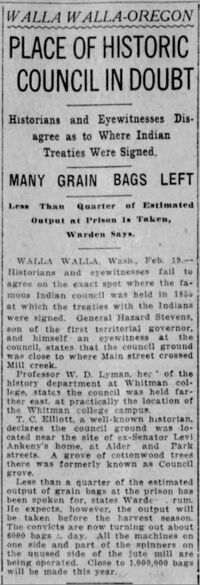1914-02-20-sr-p10-prison-makes-grain-bags
February 20, 1914 Spokesman-Review Page 10:
WALLA WALLA-OREGON
PLACE OF HISTORIC COUNCIL IN DOUBT
Historians and Eyewitnesses Disagree as to Where Indian Treaties Were Signed,
MANY GRAIN BAGS LEFT
Less Than Quarter of Estimated Output at Prison Is Taken, Warden Says.
WALLA WALLA, Wash., Feb. 19.— Historians and eyewitnesses fail to agree on the exact spot where the famous Indian council was held in 1855 at which the treaties with the Indians were signed. General Hazard Stevens, son of the first territorial governor, and himself an eyewitness at the council, states that the council ground was close to where Main street crossed Mill creek,
Professor W. D. Lyman, head of the history department at Whitman college, states the council was held farther east, at practically the location of the Whitman college campus.
T. C. Elliott, a well-known historian, declares the council ground was located near the site of ex-Senator Levi Ankeny's home, at Alder and Park Streets. A grove of cottonwood trees there was formerly known as Council grove.
Less than a quarter of the estimated output of grain bags at the prison has been spoken for, states Warden Drum, He expects, however, the output will be taken before the harvest season. The convicts are now turning out about 6000 bags a day. All the machines on one side and part of the spinners on the unused side of the jute mill are being operated. Close to 1,000,000 bags will be made this year.
